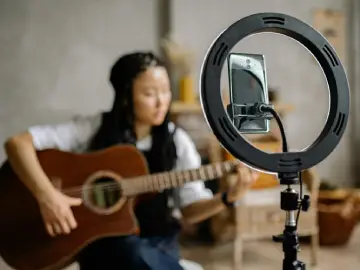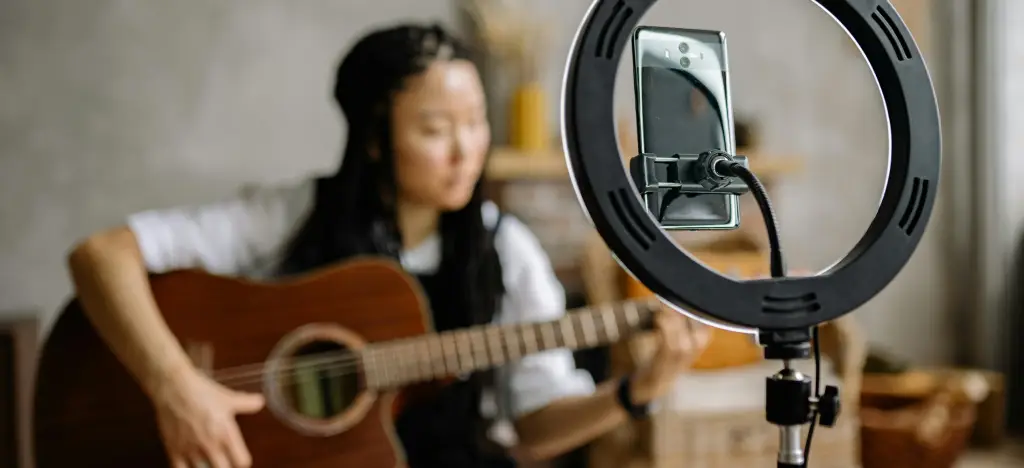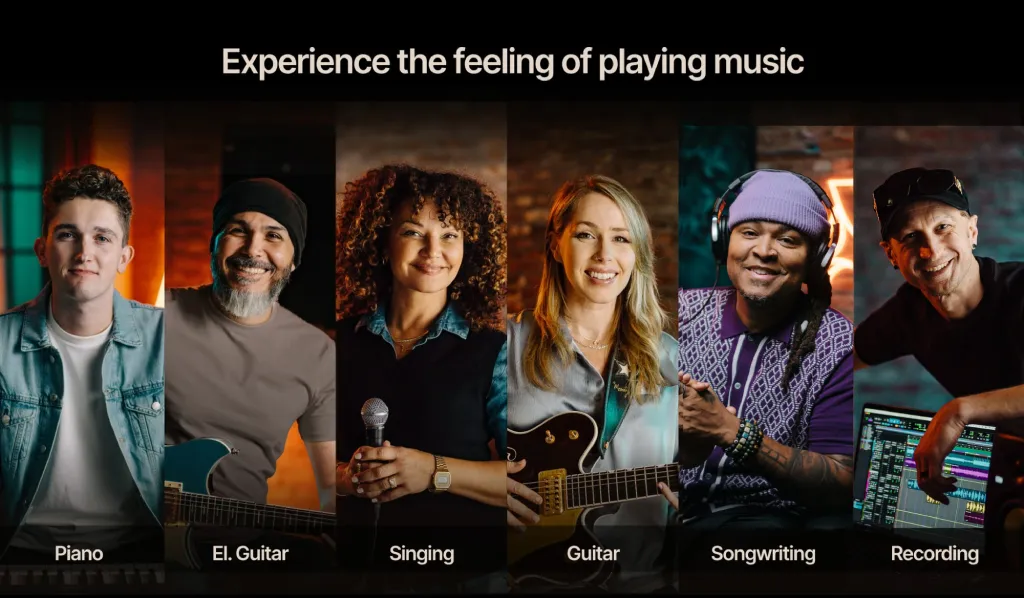The music industry in 2025 is a different beast. And I don’t mean “slightly updated from 2010.” I mean unrecognisable. Algorithms are curating what we hear. AI tools are writing full songs in seconds. And if you’re not creating content at least twice a week, you may as well not exist online.
If you’re an independent artist or a new musician trying to build a career, writing good songs is no longer enough. You need to understand the modern music landscape. That means building an online audience, learning how to use AI tools for music, protecting your mental health, and treating your music like a business.
So what should you be learning today if you want to keep your music alive and your career moving?
These are the new essentials. Skills no one taught us, but ones we can’t afford to ignore.
- 1. Why smart musicians never stop learning
- 2. Embrace AI — but don’t let it replace your voice
- 3. Be a content creator (but don’t become one)
- 4. Finish your music — not just start it
- 5. Play music live (even if it’s from your bedroom)
- 6. Understand the real music business
- 7. Build real fan relationships
- 8. Look after your mindset (and your body)
- 9. Treat your music like a business (even if you hate the word)
- Final thoughts
- Learn from Grammy-winning songwriters, viral producers, and pro musicians
1. Why smart musicians never stop learning
How do independent musicians stay relevant?
By learning faster than the industry changes — and that means constantly adapting.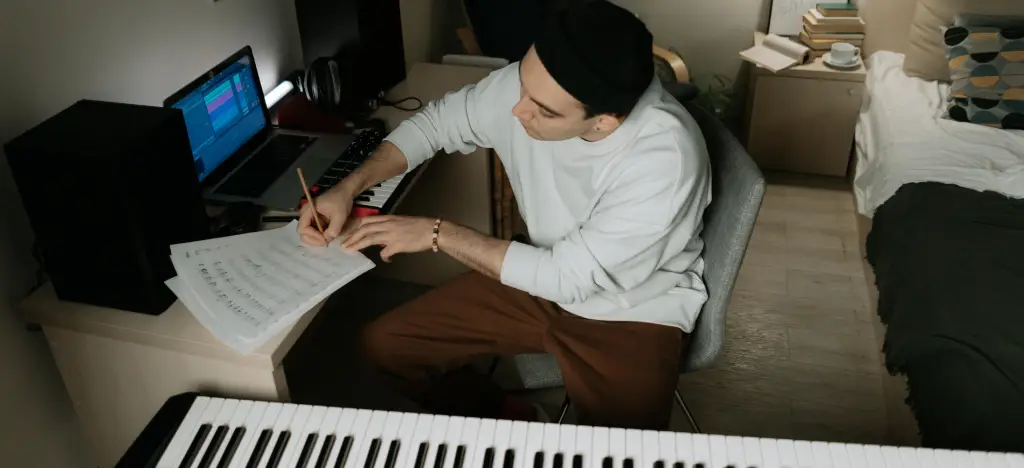 Here’s an uncomfortable truth: everything is changing, all the time in the music industry.
Here’s an uncomfortable truth: everything is changing, all the time in the music industry.
The plugin you finally wrapped your head around last month? It’ll be redesigned by next Tuesday. That TikTok trend you thought might work for your next single? It’s already buried under 400 new ones. The platform that felt like a safe bet in 2023 might not even exist in 2026.
Waiting until you “feel ready” is the fastest way to get left behind.
But here’s the flip side. You don’t need to master everything. You just need to get good at adapting. Learn faster. Experiment sooner. Let go of perfectionism.
Here’s how to learn more effectively as a musician:
🎯 Pick monthly micro-goals – Choose one new skill each month. A DAW shortcut, a TikTok feature, a vocal chain trick, or a better lighting setup. Keep it small.
🎯 Break down big ideas – Don’t try to “learn mixing” — just figure out how to EQ a vocal. Don’t “learn video editing” — trim a 15-second clip and add captions.
🎯 Get feedback early – Share rough versions. Post your work-in-progress. You’ll learn more by doing — not waiting.
This mindset is the difference between artists who stay current and artists who quietly stop releasing music.
💡 Want to learn piano more effectively?
Meet Artie — an AI piano teacher that actually listens to your playing and gives real-time feedback to help you improve faster.
Download Artie for free now
2. Embrace AI — but don’t let it replace your voice
Should musicians use AI?
Absolutely. But how you use it makes all the difference.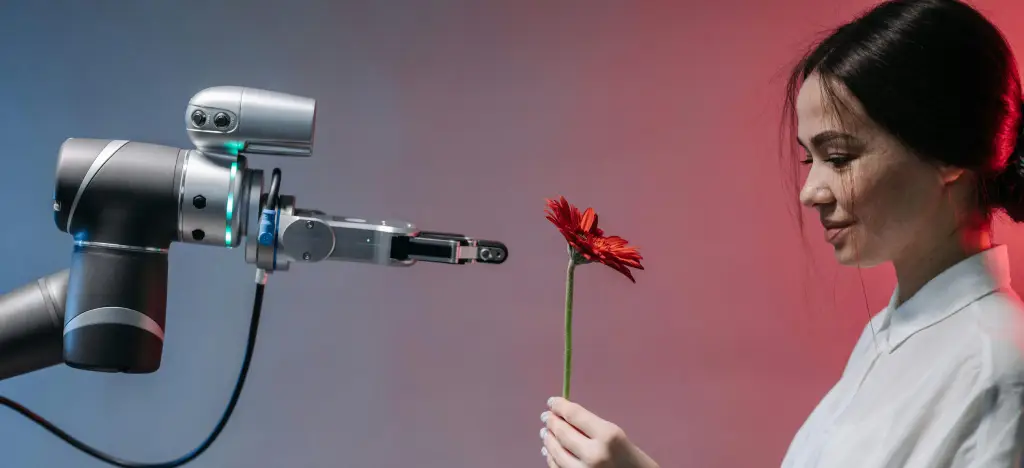 Let’s get this out of the way: AI isn’t going anywhere, and it's already changing how musicians work. According to a study by DITTO, nearly 60% of artists now use AI in their music projects.
Let’s get this out of the way: AI isn’t going anywhere, and it's already changing how musicians work. According to a study by DITTO, nearly 60% of artists now use AI in their music projects.
But it’s not just helping musicians. In some cases, it’s replacing them. There are entire albums online right now written, sung, and mixed by machines. Some of them have millions of streams. And most people don’t even notice.
That said, AI can also be your biggest creative ally. Used well, it’s a sketchpad, a co-writer, a brainstorming tool. Used badly, it’s a conveyor belt for generic sludge.
Here’s how to use it without losing your artistic identity:
✅ AI tools that help (not replace):
Orb Producer Suite – Generates chord progressions and melodic patterns
Hookpad – Helps with harmony and song structure
WavTool – AI-assisted browser-based DAW
InstaComposer 2 – Great for quick MIDI ideas
ChatGPT – Lyric brainstorming, artist bios, marketing help
These aren’t cheat codes — they’re conversation starters. Think of them like jamming with a bandmate who throws out weird ideas that you can accept or ignore.
❌ Avoid overreliance on full-song generators:
Suno AI and Udio – Create entire tracks from text prompts
AIVA – Composes music in dozens of styles with minimal human input
Cool tech? Sure. But also a slippery slope, especially when these songs start appearing in playlists next to yours, without credit, context, or a human behind them.
💡 ARTMASTER TIP: Find out more in — AI music revolution? Tools reshaping the music industry in 2025.
3. Be a content creator (but don’t become one)
Do musicians really need to create content now?
Yes — but you don’t have to become a full-time influencer to do it.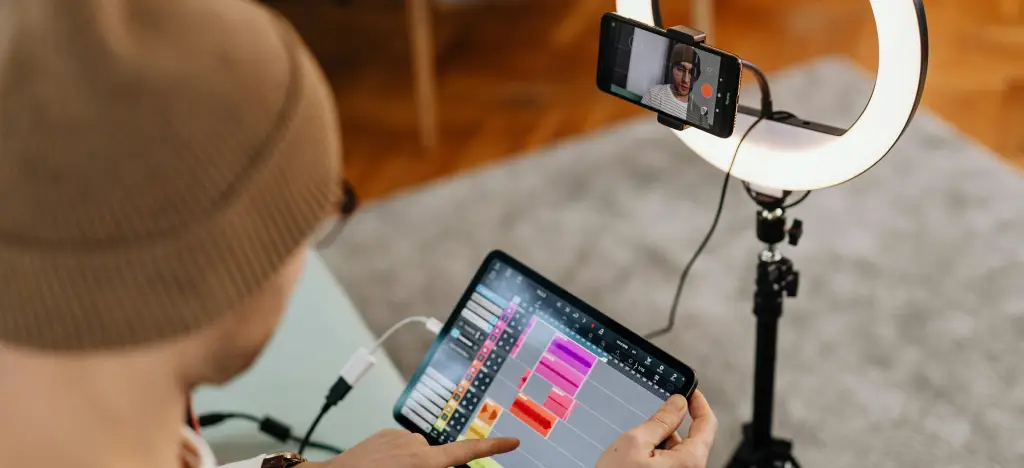 Let’s not pretend content creation isn’t part of the job now — it is. If you want your music heard in 2025, people need a way to find you. And that usually means short-form video (TikTok, Instagram Reels, and YouTube Shorts), behind-the-scenes posts, or just showing up regularly online.
Let’s not pretend content creation isn’t part of the job now — it is. If you want your music heard in 2025, people need a way to find you. And that usually means short-form video (TikTok, Instagram Reels, and YouTube Shorts), behind-the-scenes posts, or just showing up regularly online.
You don’t need to become an influencer. You don’t need a ring light in every room or a fake morning routine. You just need to be visible and genuine.
Fortunately, there are AI video editor tools that simplify the entire process, allowing you to focus more on your craft. These tools can also assist in adding subtitles, converting audio to text, and automatically enhancing video quality with just a few clicks. You can even use them to repurpose long-form content into bite-sized clips personalized for each platform.
Simple content ideas for musicians:
🎥 Film stripped-back performances – One-take videos of your songs (no editing, just vibes)
📱 Share behind-the-scenes moments – Voice notes, lyrics in progress, or that 3am demo
🎛️ Show off your gear setup – Whether it’s budget or bougie, people love to see your creative space
🎤 Answer questions – “What mic do you use?” “What’s that chord?” “What inspired this song?”
Turn one song into a week’s worth of content:
Tease the hook on TikTok
Explain the lyrics on Instagram
Post a YouTube Short of you recording it
Ask fans which version they like best
Share a funny outtake
The key is batching. Record 3–5 short clips in one sitting. Change your T-shirt if you like — not your personality.
💡 ARTMASTER TIP: The right gear makes content easier. Not fancy — just functional. See our essential tools for home music production.
4. Finish your music — not just start it
Why do so many musicians struggle to release their songs?
Because finishing is scary — and starting is safer. But releasing imperfect work beats sitting on potential every time.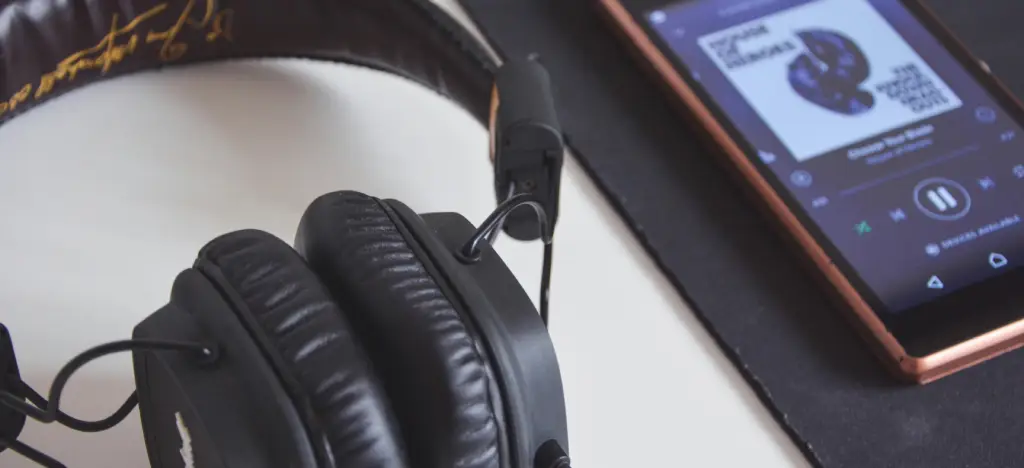 We’ve all got that folder. The one stuffed with half-finished ideas, mumbled hooks, promising intros that never made it to verse two. It’s the modern musician’s junk drawer. But unfinished tracks don’t build a career.
We’ve all got that folder. The one stuffed with half-finished ideas, mumbled hooks, promising intros that never made it to verse two. It’s the modern musician’s junk drawer. But unfinished tracks don’t build a career.
No one can stream a chorus you never finished. And in 2024, streaming officially became the top revenue source for independent artists — surpassing both downloads and physical sales (source: Forbes).
What moves you forward is finishing. Not perfecting — finishing. Even if it’s rough around the edges. Even if you wish you had more time. Releasing music is how people find you, how you learn, and how you improve.
Here’s how to actually get tracks out the door:
Streamline your workflow. Use tools that cut friction. BandLab is great for sketching ideas and collaborating quickly. Landr can help with instant mastering that’s good enough to release. DistroKid or Tunecore will push your music to Spotify, Apple Music, and everywhere else without needing a label.
Set deadlines and make them public. Announce a release date on Instagram or TikTok, even if it’s just to a handful of followers. It adds just enough pressure to push you over the finish line.
Think smaller. Not every release has to be an album or even a full single. A verse-and-chorus loop or a 60-second idea can be enough for TikTok or YouTube Shorts. The goal is to create momentum — not masterpieces.
Ditch perfectionism. The most successful independent artists aren’t the ones who get it right the first time. They’re the ones who put things out, learn what works, and keep going. Releasing music is a skill like any other — you get better at it by doing it more often.
At some point, you have to stop tweaking. Hit export. Upload the track. Share it with the world.
Ship. Learn. Repeat.
Because you can’t build a career on ideas. You build it on output.
💡 ARTMASTER TIP: Learn how pro songwriters actually finish tracks that connect. Read this guide or check out Printz Board’s Songwriting course — taught by the Grammy-winning co-writer of Where Is the Love?
5. Play music live (even if it’s from your bedroom)
Is playing live still relevant if you’re not touring?
Yes — and maybe more than ever. In 2025, live doesn’t just mean stages. It means screens, streams, and showing up anywhere people can see and hear you play.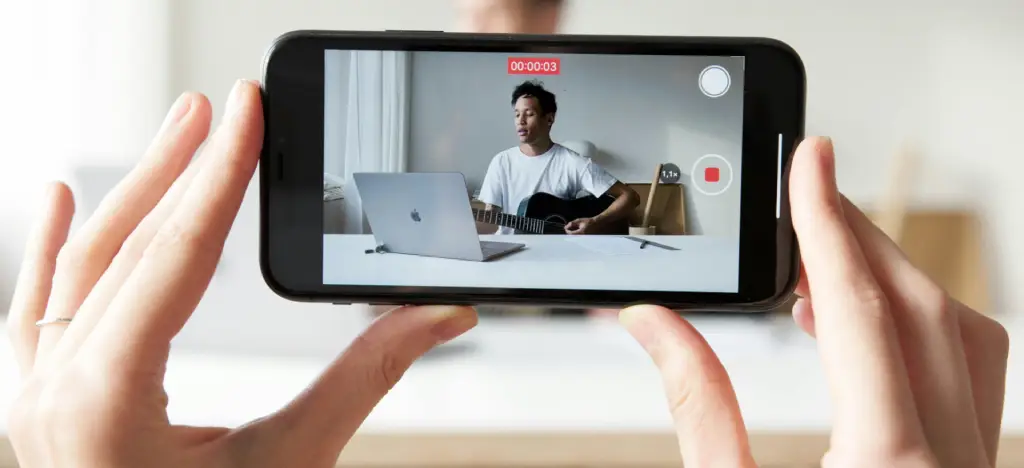 Playing live used to mean sticky floors, local venues, and dragging gear up narrow stairs. That still exists — and it still matters. But now, “gigging” also means setting up your phone, going live from your bedroom, and performing to 20 people on TikTok.
Playing live used to mean sticky floors, local venues, and dragging gear up narrow stairs. That still exists — and it still matters. But now, “gigging” also means setting up your phone, going live from your bedroom, and performing to 20 people on TikTok.
The audience is everywhere now, and the barriers are lower than ever. You don’t need a booking agent or a local scene to get going. You just need to show up.
Your digital stage setup:
Instagram Live + TikTok Live = instant feedback, casual vibes, no gatekeepers
YouTube Live = better for longer sets, Q&As, or teaching sessions
Twitch = great if you want to build a streaming habit with real-time chat
OBS or Streamlabs = for those who want multiple camera angles, overlays, or pro audio routing
Your basic live kit:
Ring light — because bad lighting makes everything feel amateur
Clip-on mic or USB condenser — because people will forgive grainy video, but not muffled sound
Audio interface — especially if you’re streaming vocals and instruments separately
Remember: it’s not about perfection. It’s about connection. A livestream with 12 engaged viewers can do more for your career than an anonymous post with 10,000 views.
Fans want to see you make mistakes. They want the in-between bits. They want real.
So if you’re not performing somewhere — online or off — you’re missing one of the strongest ways to build genuine engagement.
💡 ARTMASTER TIP: Want simple songs that work live — even if you’re just streaming from your bedroom?. Start with these:
6. Understand the real music business
Do you really need to know music industry stuff if you're indie?
Absolutely. Most successful independent artists in 2025 are the industry — publishing, licensing, contracts, and royalties are all part of your world now.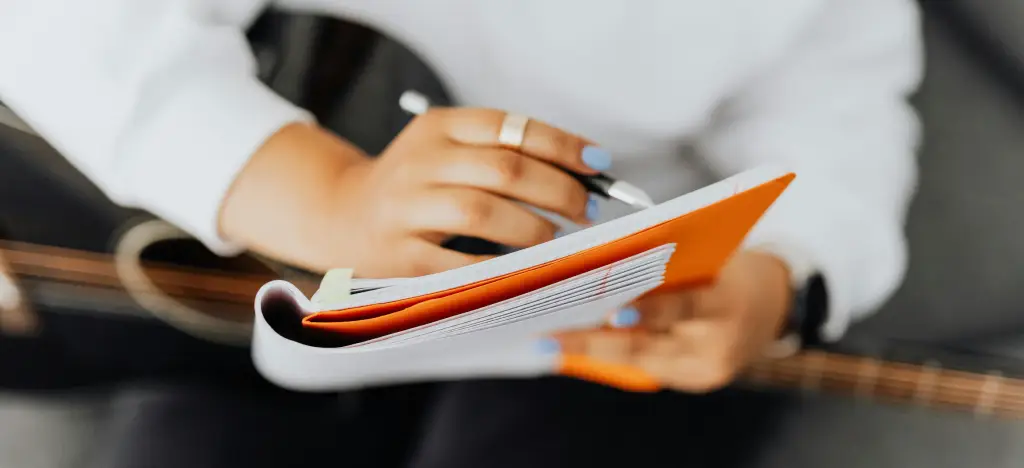 The dream of being spotted by a label rep in the crowd is mostly fantasy now, and to be honest, it probably always was. Today, most musicians build their careers without any label at all. But that only works if you stop thinking like “just” an artist and start thinking like an operator.
The dream of being spotted by a label rep in the crowd is mostly fantasy now, and to be honest, it probably always was. Today, most musicians build their careers without any label at all. But that only works if you stop thinking like “just” an artist and start thinking like an operator.
You are sitting on intellectual property. But if you don’t understand how it works — or worse, if you ignore it — someone else will profit from it instead.
Learn the language of your own career:
Publishing: These are the rights to your compositions — lyrics and melodies. Not the recordings, the songs themselves.
Licensing: This gives others permission to use your music in things like ads, films, or games — often the biggest income source for indie artists.
Copyright: This proves you made it. And it protects you when someone else rips it off.
What smart indie artists do now:
Join a PRO (Performance Rights Organisation) — e.g. PRS (UK), ASCAP or BMI (US)
Use Songtrust or Sentric to collect global royalties
Tag and register your songs correctly — metadata errors = lost money
Don’t rely on Spotify streams — build income from:
Music licensing sites like Artlist, Epidemic Sound, Musicbed
SoundBetter/Fiverr for services (e.g. mixing, vocal features, songwriting)
And seriously — start an email list. Social platforms rise and fall. TikTok could be banned tomorrow. But your mailing list? That’s yours.
This isn’t about “selling out.” It’s about getting what you’ve earned. If you don’t value your music like a business, the industry definitely won’t either.
💡 ARTMASTER TIP: For more insights into the music business and how to succeed, take a look at our guide: How the Grammys are won.
7. Build real fan relationships
Can you grow a music career without loyal fans?
Not really. Streams and algorithms might give you numbers, but it’s real fans who give you staying power.
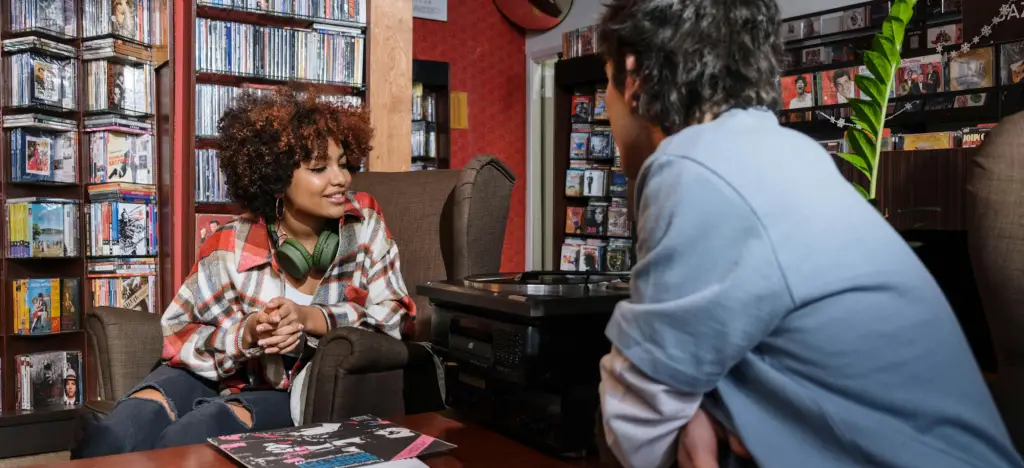 Algorithms might get your music heard. But they won’t make anyone care.
Algorithms might get your music heard. But they won’t make anyone care.
Real fans — the kind who show up to gigs, share your songs, and buy your merch — don’t appear out of nowhere. You earn them. And in 2025, that means doing more than just posting clips. It means starting conversations.
Turn listeners into loyal fans:
💬 Reply to comments — it sounds basic, but most artists don’t bother
🗳️ Use polls and Q&As — “What should I record next?” “Which version hits harder?”
📩 Answer your DMs — a 5-second voice note can stick with someone for years
🎙️ Share your process — not just the polished track, but the struggle behind it
🎞️ Post unseen moments — the voice cracks, the gear failures, the laughs in between takes
People want to feel like they know the artist behind the song. They want to root for you. They want to be part of your story.
You don’t need to overshare or post 24/7. But if someone reaches out, meet them halfway.
Ten real fans are worth more than ten thousand passive ones. Because real fans don’t just stream — they buy, share, show up, and stick around.
💡 ARTMASTER TIP: Real connection comes from honesty. Our ArtMaster courses don’t just teach you to play better — they help you express who you are as an artist and build a fanbase that actually cares.
8. Look after your mindset (and your body)
Burnout isn’t a badge of honour. So why do so many musicians wear it like one?
Because in 2025, the pressure to “do it all” has never been higher — write, record, post, engage, reply, promote, repeat.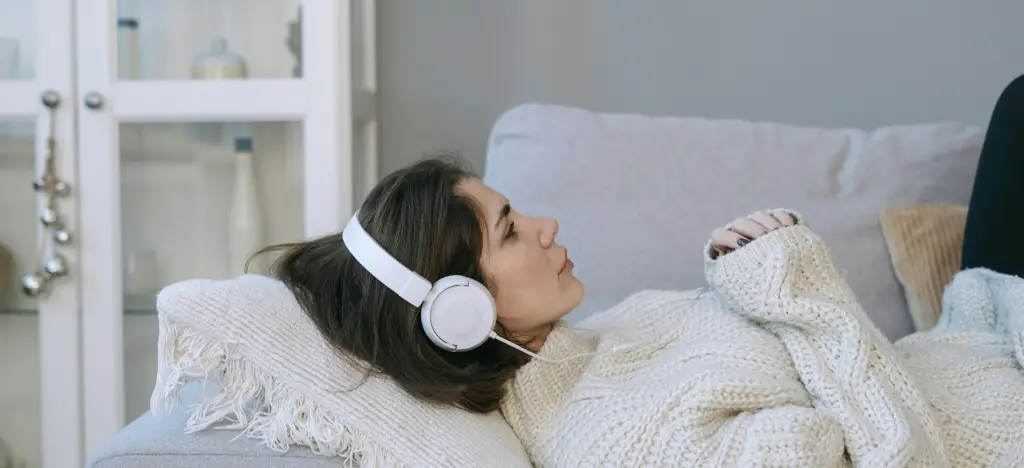 But if you treat yourself like a content machine, your creativity will eventually break down.
But if you treat yourself like a content machine, your creativity will eventually break down.
Sustainability isn’t just about money. It’s about mental and physical health too.
Simple ways to protect your energy as a musician:
⏱️ Work in short sprints – try 25-minute Pomodoro sessions to stay focused without burning out
🧠 Schedule real rest – unplug your phone, go outside, protect your off-time like it’s studio time
🎧 Protect your ears – use earplugs at gigs and don’t mix too loud — hearing damage is forever
💤 Respect sleep and food – this isn’t a hustle cliché, it’s brain fuel
🤝 Know your limits – it’s okay to pause, slow down, or ask for help
Your music will only be as strong as the mindset that supports it. Don’t sacrifice your well-being for output. You’ll create better when you feel better — and your audience will feel it too.
💡 ARTMASTER TIP: Feeling overwhelmed? Playing music isn’t just creative — it’s therapeutic. So next time burnout creeps in, don’t scroll. Play. Even 10 minutes at the keys or guitar can help reset your brain — and reconnect you with why you started in the first place. Discover more about how learning music benefits the brain and body.
9. Treat your music like a business (even if you hate the word)
Do you really need to think like an entrepreneur to succeed in music?
Yes — but that doesn’t mean selling out. It means staying in control.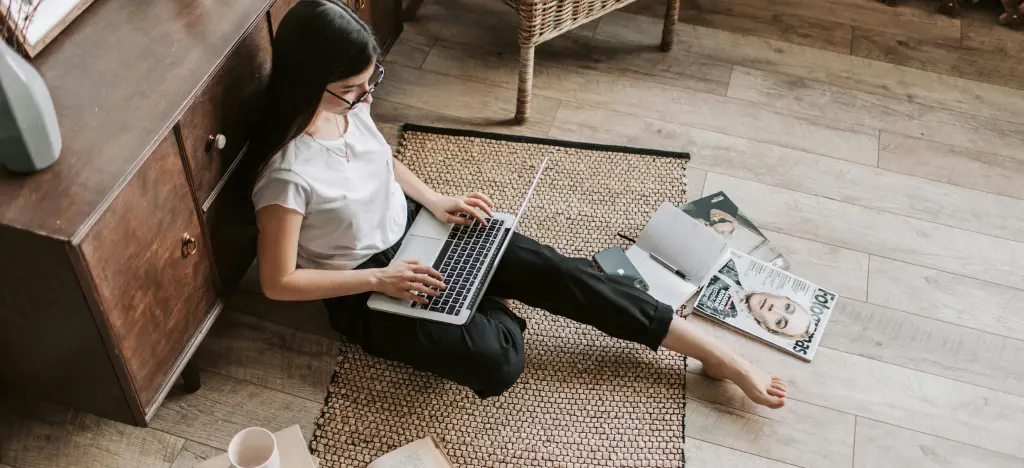 If the phrase “music entrepreneur” makes your skin crawl, fair enough. But unless you’ve got a manager, label, accountant, and assistant working for you — you’re it. The team is you.
If the phrase “music entrepreneur” makes your skin crawl, fair enough. But unless you’ve got a manager, label, accountant, and assistant working for you — you’re it. The team is you.
Being creative doesn’t mean being disorganised. And understanding your money doesn’t mean you're only in it for the cash. It means you want to keep going.
What this actually looks like:
Track your income and expenses — even just in a spreadsheet. Know what’s coming in from gigs, streams, merch, lessons, and what’s going out on gear, plugins, travel.
Protect your rights — copyright your songs, file your works with your PRO, and use proper contracts when you collaborate.
Offer more than just songs — create sample packs, offer one-to-one sessions, run a Patreon, make loop kits, sell lyric sheets. You don’t need to monetise everything, but you should be aware of what you’ve got to offer.
The point isn’t to become a cold-hearted brand. It’s to make your creativity sustainable. If you treat music as a hobby, that’s what you’ll get back. But if you treat it like a business, you give yourself the freedom to keep creating — without burning out or going broke.
You’re not just a musician. You’re a one-person ecosystem.
Final thoughts
Let’s be clear — this isn’t about selling out. It’s about staying in the game. Staying creative, consistent, and clear-headed.
You don’t need to jump on every trend or pretend to be someone you’re not. But if you want your music to cut through in 2025, talent alone won’t cut it. You need to be strategic. Flexible. Willing to treat your creativity like something worth protecting.
Music is still about expression — that part hasn’t changed. But what’s changed is everything else: the pace, the tools, the expectations.
So keep learning. Keep turning up. Keep making work that actually says something.
Because the tools might be getting smarter — but your voice is still the thing that matters most.
Learn from Grammy-winning songwriters, viral producers, and pro musicians
What if you could learn directly from the people behind the hits? The ones who’ve toured with Dua Lipa, co-written with the Black Eyed Peas, racked up millions of views online — and still know what it’s like to be figuring things out from your bedroom setup.
That’s what ArtMaster gives you: practical, real-world advice from artists who’ve actually done it.
Whether you're picking up your first instrument or sharpening your songwriting, there’s a course for you — taught by someone who’s lived it.
👉 Start your 7-day free trial and get instant access to every course.
About the author
Matt Ford is a musician, teacher, writer, and lifelong student of sound.
With years of experience in both performing and teaching, he shares practical advice through ArtMaster to help musicians at every level build skill and confidence in their playing.
